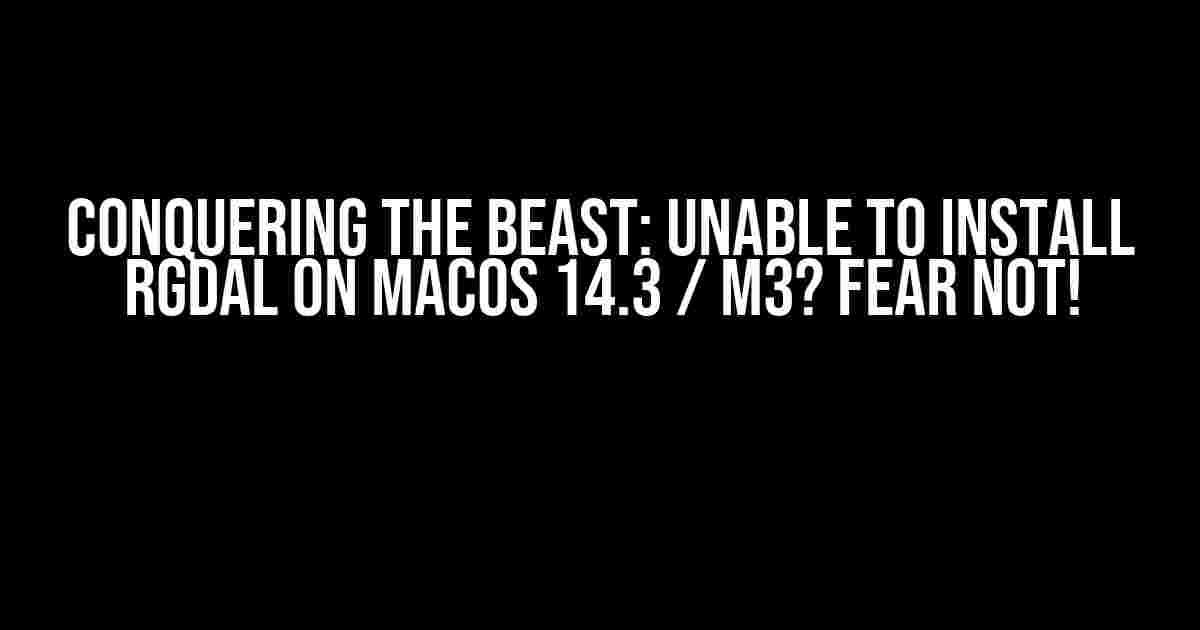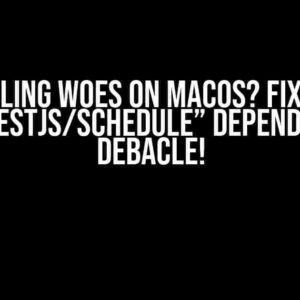Are you tired of banging your head against the wall, trying to install rgdal on your shiny new macOS 14.3 / M3 machine? Well, put down that aspirin and take a deep breath, because we’ve got you covered! In this article, we’ll embark on a thrilling adventure to vanquish the error message “Unable to install rgdal” and get you back to crunching those geospatial numbers in no time.
What’s the Big Deal About rgdal?
rgdal is a fantastic R package that allows you to manipulate and analyze geospatial data with ease. It’s a crucial tool for anyone working with spatial data, and its absence can be a significant roadblock. But fear not, dear reader, for we’re about to tackle the most common issues that might be preventing you from installing rgdal on your macOS 14.3 / M3 machine.
Issue #1: Xcode and the SDK Conundrum
One of the most common culprits behind the “Unable to install rgdal” error is the lack of Xcode and the corresponding SDK. If you haven’t installed Xcode on your machine, you’ll need to do so before trying to install rgdal. But that’s not all – you’ll also need to ensure you have the correct SDK installed.
Step-by-Step Solution:
-
Open the App Store on your Mac and search for Xcode.
-
Click the “Get” button, then click “Install” to begin the download and installation process.
-
Once Xcode is installed, launch it and agree to the terms and conditions.
-
Open a terminal and type the following command to verify that Xcode is installed correctly:
xcode-select -p -
If you receive an error message, you may need to reinstall Xcode or restart your machine.
Issue #2: GDAL and the Missing Libraries
Another common issue is the lack of required libraries, specifically GDAL. rgdal relies on GDAL to function, so it’s essential to have the correct versions installed.
Step-by-Step Solution:
-
Open a terminal and type the following command to install GDAL using Homebrew:
brew install gdal -
Verify that GDAL is installed correctly by typing:
gdalinfo --version -
If you encounter any issues, you may need to reinstall GDAL or adjust your PATH environment variable.
Issue #3: PROJ and the Coordinate Conundrum
PROJ is another critical dependency for rgdal, and issues with its installation can prevent rgdal from working correctly.
Step-by-Step Solution:
-
Open a terminal and type the following command to install PROJ using Homebrew:
brew install proj -
Verify that PROJ is installed correctly by typing:
proj -v -
If you encounter any issues, you may need to reinstall PROJ or adjust your PATH environment variable.
Issue #4: R and the rgdal Package Itself
Finally, we need to ensure that R is installed and configured correctly, and that the rgdal package is installed from the correct repository.
Step-by-Step Solution:
-
Open a terminal and type the following command to install R using Homebrew:
brew install r -
Launch R by typing:
R -
In the R console, type the following command to install rgdal from the correct repository:
install.packages("rgdal", repos="https://cran.rstudio.com/') -
Verify that rgdal is installed correctly by typing:
library(rgdal) -
If you encounter any issues, you may need to reinstall rgdal or check the R console output for error messages.
Troubleshooting Tips and Tricks
Still having issues? Don’t panic! Here are some additional tips to help you troubleshoot the “Unable to install rgdal” error:
-
Check your R version: Ensure you’re running the latest version of R, as older versions may not be compatible with rgdal.
-
Verify your PATH environment variable: Ensure that your PATH variable includes the correct paths to GDAL, PROJ, and R.
-
Check for conflicts with other packages: If you have other geospatial packages installed, try uninstalling them and then reinstalling rgdal.
-
Consult the rgdal documentation: The rgdal package documentation provides detailed installation instructions and troubleshooting guides.
Conclusion
With these steps and troubleshooting tips, you should now be able to install rgdal on your macOS 14.3 / M3 machine without any issues. Remember to stay calm, patient, and methodical in your approach, and don’t hesitate to seek help if you need it. Happy geospatial number-crunching!
| Issue | Solution |
|---|---|
| Xcode and SDK Conundrum | Install Xcode and ensure correct SDK installation |
| GDAL and Missing Libraries | Install GDAL using Homebrew and verify installation |
| PROJ and Coordinate Conundrum | Install PROJ using Homebrew and verify installation |
| R and rgdal Package Issues | Install R using Homebrew, launch R, and install rgdal from correct repository |
By following these steps and troubleshooting tips, you’ll be well on your way to conquering the “Unable to install rgdal” error and unlocking the full potential of geospatial data analysis on your macOS 14.3 / M3 machine.
Frequently Asked Question
Stuck on installing rgdal on your shiny new macOS 14.3 / M3? Don’t worry, we’ve got you covered!
Why can’t I install rgdal on my macOS 14.3 / M3?
rgdal package requires certain dependencies like GDAL and GEOS, which might not be installed or configured correctly on your system. Additionally, macOS 14.3 / M3 might have some compatibility issues with these dependencies, causing the installation to fail.
How can I fix the installation issue with rgdal?
Try reinstalling GDAL and GEOS using Homebrew by running the commands `brew reinstall gdal` and `brew reinstall geos`. Then, try installing rgdal again using `install.packages(“rgdal”)`. If you’re still facing issues, you can try installing an older version of rgdal using `install.packages(“rgdal”, version = “1.5-23”)`.
What if I’m still having trouble installing rgdal?
Try resetting your R package library by running `remove.packages(“rgdal”)` and then `install.packages(“rgdal”)`. If that doesn’t work, try reinstalling R and then installing rgdal again. You can also try installing rgdal from source using `install.packages(“rgdal”, type = “source”)`.
Can I use an alternative to rgdal?
Yes, you can use the sf package as an alternative to rgdal. sf is a more modern and actively maintained package that provides similar functionality to rgdal. You can install sf using `install.packages(“sf”)`.
Where can I get more help with installing rgdal?
You can check out the rgdal documentation and vignettes for more information on installation and usage. You can also search for similar issues on Stack Overflow, GitHub, or the R-sig-geo mailing list. If you’re still stuck, feel free to ask for help on these platforms or seek assistance from a local R expert!


